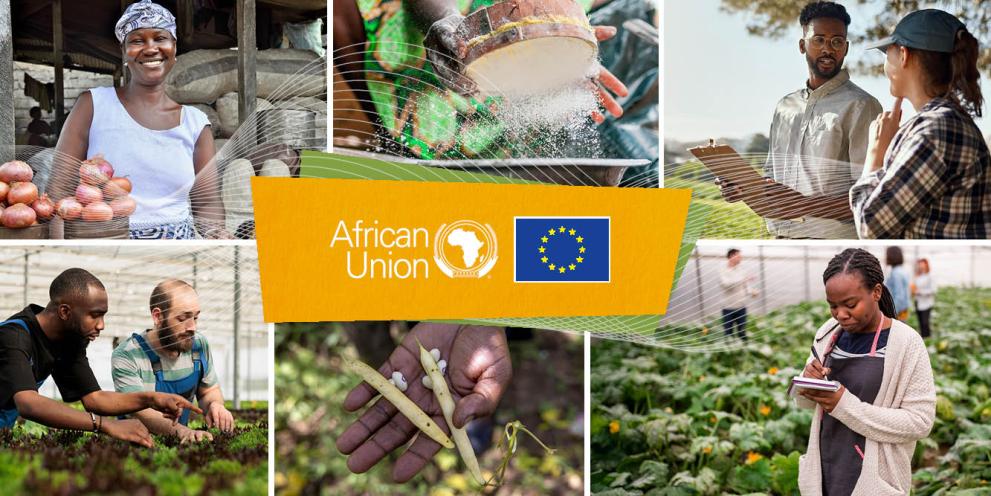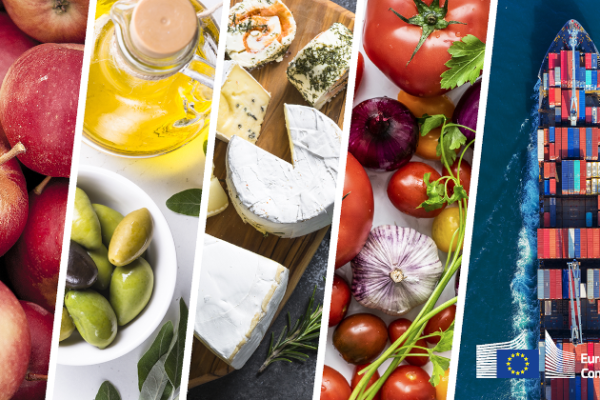
European and African agriculture ministers gathered in Rome on 27 June for the sixth African Union (AU)-European Union (EU) Agriculture Ministerial Conference. They were joined by AU Commissioner Moses Vilakati and European Commissioner for agriculture and food Christophe Hansen. The conference focused on a wide range of issues impacting agriculture and the agri-food sectors on both continents like sustainability and climate resilience, investing in agri-food value chains, market access, trade facilitation and research and innovation. The African Union’s signature of the EU’s Mission Soil manifesto was also part of the programme.
Joint press release by Moses Vilakati, African Union Commissioner for Agriculture, Rural Development, Blue Economy and Sustainable Environment and Christophe Hansen, European Union Commissioner for Agriculture and Food
On the sixth African Union-European Union Agriculture Ministerial Conference
Rome, 27 June 2025
Today, the gathering of African and European ministers of agriculture showed the strong cooperation between our two continents and strong partnership between our two Unions, particularly in strengthening our work to address challenges facing agriculture and food systems. At the occasion of this meeting, the European Commission and the International Fund for Agricultural Development (IFAD) announced a new €26 million capacity-building programme to strengthen African farmers’ organizations and enhance their role in agricultural value chains, with support from EU’s Neighbourhood, Development and International Cooperation Instrument – Global Europe (NDICI-GE).
We recognise the deep alignment of our strategies for the future of agri-food systems, as set out in the African Union’s Comprehensive African Agriculture Development Programme (CAADP) Kampala Declaration and the CAADP Strategy and Action Plan (2026-2035) and the European Commission’s Vision for Agriculture and Food. Both the CAADP and the Vision emphasise the importance of agricultural development for economic growth, poverty reduction, food security, nutrition, and Resilience.
Throughout the day, we examined a range of topics which are essential for the transition to sustainable agriculture and food systems. We exchanged experiences regarding sustainable practices in agriculture that are vital for improving climate resilience and soil health, highlighting the value of research and innovation as well as that of agroecological practices and living labs to facilitate sustainable and resilient agriculture. The activities under the Food and Nutrition Security and Sustainable Agriculture (FNSSA) partnership have been instrumental in reinforcing the impact of research and innovation on the ground. In addition, the EU Mission Soil opens up many new opportunities for both sides to work together.
Our discussions clearly show that we need adequate and inclusive investment and financing in agri-food value chains to make progress in all these areas. Predictable market access, alongside trade facilitation and reduction of agricultural trade distortions, were highlighted as important drivers of agricultural prosperity that can make a positive contribution to achieving the Sustainable Development Goals and the African Union Agenda 2063 ‘’the Africa that we want’’. The views of farmers and their organisations were welcomed and considered, notably from youth and women, who represent the present and future of our rural communities. Ongoing vocational training programs, especially those fostering AU-EU youth farmer exchanges, and enhanced support for women-led businesses in agri-value chains are central to our shared vision of inclusive growth.
Commissioner Hansen:
The agri-food sector plays an essential role for both Europe and Africa. I'm delighted to see the European Union and its Member States standing shoulder-to-shoulder with our partners in the African Union to drive real change. The European Union and its Member States reiterated today a firm commitment to support the implementation of the Comprehensive African Agriculture Development Programme Strategy and Action Plan 2026-2035, notably through the Team Europe approach and the EU’s Global Gateway Africa-Europe Investment Package. This is illustrated by the declaration of the European Union and its Member States. Together, we're committed to unlocking the full potential of the agricultural sector and building a brighter future for generations to come. Our partnership is built on trust, solidarity, and a shared vision for a more just and prosperous world. We are firmly committed to making the upcoming 7th EU-AU Summit a success.
Commissioner Vilakati:
I am pleased to see the continuous cooperation and partnership between the European Union and the African Union especially the EU readiness to support to the CAADP domestication process. We share similar challenges to agriculture and food systems, and it is important to cultivate synergies in our efforts to address them together. Today, in the spirit of the Soil Health Initiative for Africa launched at the May 2024 Africa Fertiliser and Soil Health Summit, in the presence of Commissioner Hansen, I signed the EU Mission Soil Manifesto, thereby stressing that in Africa and Europe alike, soils are a fragile resource that needs to be carefully managed and safeguarded for future generations. We can all contribute to halting soil degradation and building a sustainable future based on healthy soils for food, people, nature, and climate. My ambition is that we carefully conduct a continental wide soil Mapping in Africa and ensure that Africa leads in the development of regional fertilizer blended plants suitable for its soils.
This Ministerial Conference and its side events have shown that the African Union-European Union Rural Transformation Action Agenda launched in 2019 has led to concrete initiatives that promote responsible investment in the agri-food sector, regional trade integration, sustainable agri-food practices and innovation. We discussed opportunities to build on these successes and step up initiatives in areas such as:
- Farmers’ Organisations – We welcome the ongoing initiatives including cooperation among African and European farmers, through vocational training and exchanges among farmers from both continents. The new Capacity-Strengthening programme announced today will continue supporting African Farmers Organisations and enhance the position of farmers in agricultural value chains. This is a prime example of the positive cooperation leading to concrete projects on the ground.
- Evidence based policies –The Pan-African Network for economic Analysis of Policies (PANAP) has supported African regional integration, sustainable investment in African agri-food systems and the implementation of the CAADP. This year, PANAP reached a major milestone with the launch of its Operational Manual, Charter, and Steering Committee. These institutional developments anchor its role as a flagship AU-EU science-policy interface, supporting the CAADP Biennial Review and National Agri-Food Systems Investment Plans through the StEPPFoS project. Looking ahead, The Network should continue to support evidence-based policy analysis for competitive and sustainable agriculture and food systems, promoting scientific communities and supporting policymakers at all levels.
- Geographical indications – We welcome the successful implementation of the 2018–2023 Continental Geographical Indications Strategy and the African Union’s leadership in shaping the forthcoming 2026–2035 Geographical Indications Policy Framework. The continued collaboration with the African Organisation of intellectual property (OAPI) and the African Regional Intellectual Property Organisation (ARIPO), and the integration of GIs into the African continental Free Trade Area (AfCFTA) Protocol on Intellectual Property Rights, marks a new era of value-added trade and cultural recognition. The Continental Steering Committee, co-led by African Union Commission and African Union Development Agency – New Partnership for Africa’s Development (AUDA-NEPAD) , will be pivotal in this effort. The European Union is proud to announce that its financial support for geographical indications in Africa will continue in the coming months. The EU will therefore continue to support the African Union in developing and carrying out its Strategy for Geographical Indications to boost value creation and support rural communities.
These joint efforts set the stage for deepened collaboration in global fora, including the United Nations Food Systems Summit Stocktake (UNFSS+4) to take place in Ethiopia in July 2025, the G20 Agriculture Ministers’ Meeting in South Africa in September 2025, and the next African Union-European Union Summit that is planned to take place in Africa toward the end of 2025.
More information
6th African Union (AU) – European Union (EU) Agriculture Ministerial Conference
Details
- Publication date
- 27 June 2025
- Author
- Directorate-General for Agriculture and Rural Development
- Department
- Directorate-General for Agriculture and Rural Development
- Location
- Rome


